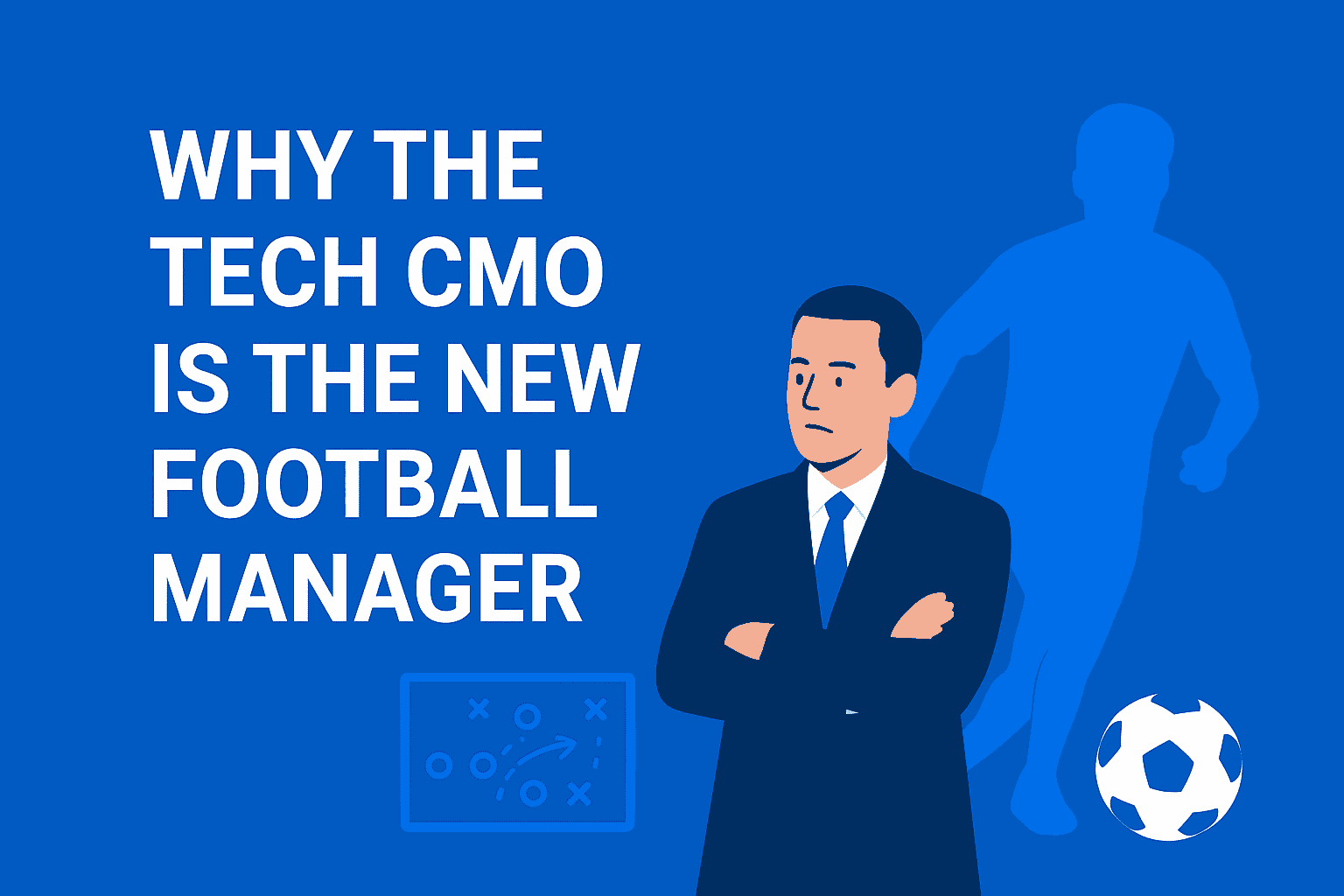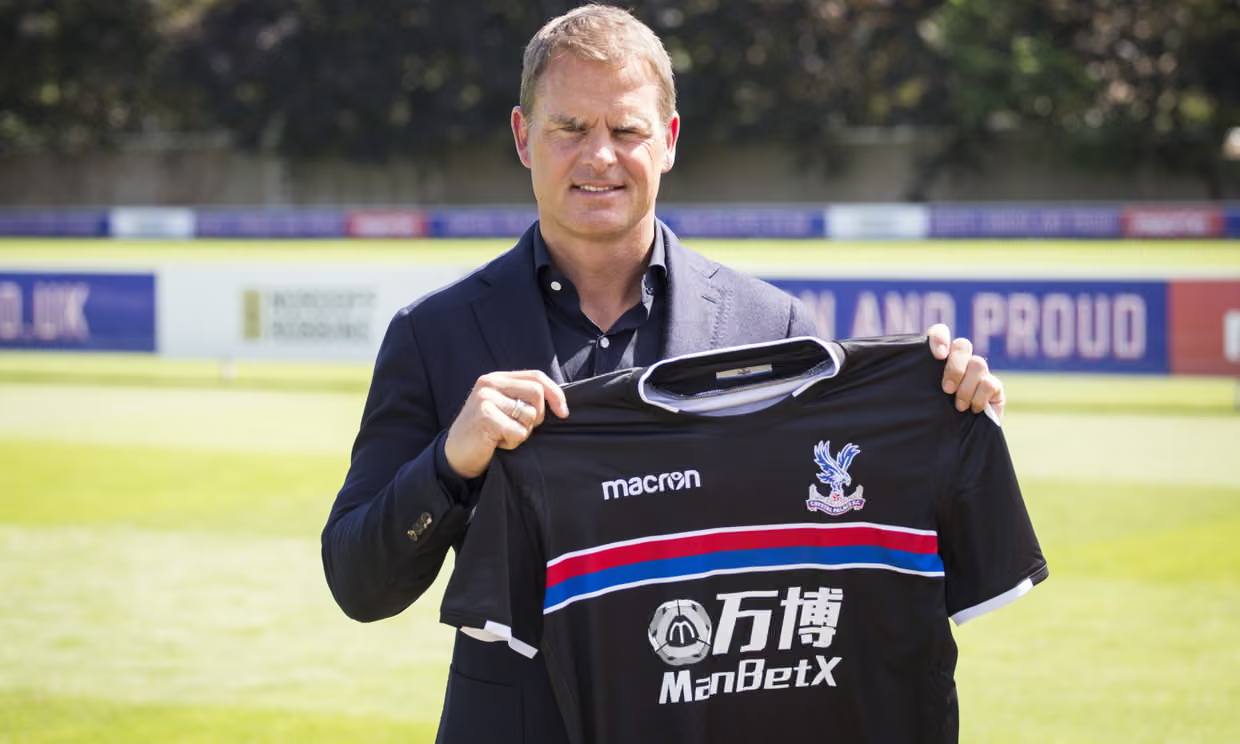Not a Ted Lasso Story…
The role of the Chief Marketing Officer (CMO) in the B2B tech industry often feels like a revolving door, much like the tenure of a football manager in the highly pressurised world of the English Premier League. If a football club loses a run of matches, the mood music immediately starts to centre around how supported the manager may or may not be by the club’s owners. Similarly, for CMOs, if sales start to falter, then it’s the marketing department that is automatically put under pressure, instead of examining the sales conversion issue. The standard approach is to fill the pipeline with new leads and hope some of them buy. Unfortunately, in these situations, it’s often regarded that the marketing engine isn’t delivering enough leads to sales, resulting in uncomfortable scrutiny. High CMO turnover undermines brand consistency, go-to-market strategy and demand generation pipelines.

Back Door Exits
The challenge is that marketing a startup effectively takes time, and building a brand requires investment. Football managers are judged by the performance of the players on the pitch, while CMOs are often judged by the volume of Marketing Qualified Leads rather than marketing generated revenue. The members of the sales team are like the CMOs proverbial football players, only they don’t get to pick them and have no line-management responsibility. Once the sales team stops performing, for whatever reason, finger-pointing in marketing’s direction begins and it’s normally the CMO’s job that is on the line. The experience of both football managers and CMOs follows a common path, as they are brought in under the spotlight, with great fanfare and the promise of high achievement. However, when results falter, they are often quietly and unceremoniously ushered out the back door under a dark cloud.
Time Can Be Unkind
Lead generation is a moving target that seems to get more elusive and complex, requiring new models to manage and monitor. The multiple channels, touch points and multi-layered content means an ever-growing team of varied roles is needed to sustain growth – and all this resource and effort is necessary just in the hope you get to penetrate the mind of a tech buyer long enough to spark a genuine interest. Sadly, much like the football manager, time can quickly run out before the market has had an opportunity to register your existence, consider your proposition and respond. Both CMOs and football managers can often lay the groundwork for success, but if results aren’t immediate, then someone else may take the glory for their hard work. Do the tenures of these two roles have surprising similarities? Let’s take a closer look at some revealing stats.
The CMO’s Tenure
First, let’s look at the life expectancy of a CMO across all industries. In 2023, Spencer Stewart’s annual “CMO Tenure Study,” which reports on fortune 500 companies, highlighted the average CMO tenure was 42 months, with a median of around 25 months. These are broad industry averages, including B2C, enterprise and global corporations, not early-stage or mid-market tech firms. However, it starts to paint a picture.
Below we look more specifically at the B2B tech startup industry:
Gartner
The 2023 Gartner study, “CMO Strategic Planning Survey,” suggests the CMO tenure between 18 and 24 months, especially in Series A-C tech startups. Gartner identifies misalignment with the CEO and inability to show short-term pipeline wins as key causes of churn.
First Round Capital
In the 2023 “State of Startups Report,” by First Round Capital, research showed that founders of B2B SaaS and tech startups reported that the CMO is the most frequently replaced executive. Over 60% of founders surveyed had replaced their first CMO within 18-24 months of hire. This highlights that the CMO is often the least understood hire at early growth stages.
OpenView Partners
The 2023 “SaaS Benchmarks Report,” by OpenView Partners, showed that B2B tech startups in their portfolio had a median CMO tenure of around 26 months. This study emphasised the importance of hiring CMOs who can align marketing with revenue, not just brand or content.
Heidrick & Struggles
In the 2023 “Route to the Top for CMOs” survey, by Heidrick & Struggles, findings showed that within tech sectors, 43% of CMOs report a lack of strategic alignment with CEOs. In B2B specifically, many CMOs face tension over brand vs pipeline expectations, leading to shorter tenures.
B2B Tech CMOs Last Half as Long
It would appear, the high-pressure nature of B2B tech startups cuts the typical CMOs tenure by around half that of more broad industry averages, as it’s more closely related with the median range. More must be done to ensure closer alignment to CEO and founder expectations, while focusing on lead generation activities to help stimulate revenues. Founders often misunderstand the CMO role, expecting overnight pipeline growth while under-resourcing the function. Therein lies the core of much of the problem.
The Football Manager’s Tenure
Now, let’s put this in perspective with our respected colleagues on the sidelines of the football pitch. Premier League clubs face similar challenges to tech startups, as they are under huge financial pressure, leading to quick dismissals after poor runs. Even successful managers are often replaced due to ownership changes, long-term vision misalignment or unmet expectations.


The League Managers Association (LMA), the body representing football managers in England, regularly reports on managerial tenure. Their findings show, the average tenure across all four English professional leagues (Premier League to League Two) has hovered around 14-18 months in recent years. In the Premier League, the average fluctuates slightly but is typically between 18 and 24 months (or 1.5 and 2 years), although it is often lower due to high turnover at struggling clubs.
Sports journalists and analysts also regularly calculate this stat. In 2023, The Athletic reported the average Premier League manager tenure at just under 18 months. BBC Sport (2022) noted that the “typical Premier League manager survives just 16-18 months,” referencing turnover data across multiple seasons. Football clubs are notorious for their “what have you done for me lately” attitude, and it seems that B2B tech startups aren’t that far behind. The comparison suggests the respective careers of the tech CMO and football manager can be similarly brutal.
The Reward for Failure
The only saving grace is that the reward of failure for top football managers can be eyewatering. When they are released by their employers, it is not unusual for contracts to be paid out in full or large settlements agreed, which is in stark contrast with the way tech CMOs get treated. In comparison, CMOs are regularly discarded, like unwanted company-branded t-shirts tossed into a landfill, with little more comfort than their notice period. The professional life of a football manager is all-encompassing, similar to the work of a CMO, and this takes a physical and psychological toll on the individual. At least football managers always have the comfort of knowing that if they hold out until a club no longer wants them, they stand to get a huge payout.
Ted Lasso Would Have a Field Day
Imagine Ted Lasso, everyone’s favourite optimistic football coach, being handed the reins of a B2B tech startup’s marketing department. His eternal optimism would be refreshing, but it wouldn’t be long before he’s asked to whip up a lead generation strategy that delivers measurable ROI faster than you can shout, “football is life!” Just as Ted found himself navigating the complexities of a game he didn’t fully understand, CMOs are often thrust into the middle of a company’s growth strategy with the expectation that they’ll score big, immediately. The parallels are striking. Both roles require an ability to adapt, think on your feet and manage the expectations of those who may not fully appreciate the intricacies of the job.

You may want to read: “Top 5 Reasons Why B2B Tech CMOs Suffer Short Tenure.”






